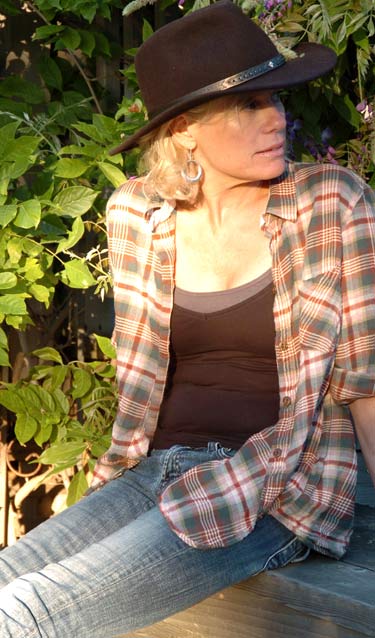Katy Boyd: in a storyteller’s voice, she brings her stories to life with smart phrasing and through the force of her personality.Hope Abides
By David McGee
PAPER HEARTS
Katy Boyd
Katy BoydWith the help of musicians from the bands of Ricky Skaggs and Delbert McClinton, and Nancy Griffiths’ producer Thomm Jutz behind the board, Katy Boyd has fashioned an album both beautiful and heartbreaking; an album that may or may not be drawn from her own experience, but feels real, and close to the bone. Boyd (who also performs with Marty Atkinson in the duo Blue Cactus Choir) sings in the voice of a storyteller, pretty and tuneful enough but more resonant for the way she brings her stories to life with smart phrasing and through the force of her personality—if you think “Rosanne Cash” as Boyd sings, good for you, because she can sound uncannily like Johnny’s firstborn, and her writer’s eye for the telling detail and the unvarnished personal statement is much akin to Ms. Cash’s. Katy Boyd, like Rosanne, owns—becomes--her songs; you can’t imagine anyone else interpreting them more vividly than she does.
Patty Boyd and Marty Atkinson perform ‘Don’t Send Me Flowers’ from their first Blue Cactus Choir albumAs for the stories, they’re not for the faint of heart, or for those seeking folky kumbaya moments of togetherness. “Mama” begins soft and solemn with a delicately fingerpicked guitar and Boyd singing tenderly, “I remember mama…” but no sooner do you think you’re into a warm reminiscence of she who gave birth to you than does Boyd complete the sentiment with an ominous “…crouched behind the door.” It’s a reminiscence, alright, but not a warm one: the mama in question is perpetuating a cycle of abuse she experienced in her own childhood, leaving her daughter to fend for herself while she smokes cigarettes, drinks coffee and gin, and serves TV dinners every day. As she does on many of her dark tales, Boyd maintains an emotional even keel while singing, dropping into a whispery tone when something really cuts deep, such as her hope that mom “might kiss me as well, but she never did…” Exactly where she’s at with all this, now that she looks back, is revealed in a weary shrug of acceptance of the hand dealt: mother “never meant to hurt anyone/it just worked out that way.” The track’s shimmering southwestern ambiance, with its gently twanging guitar and soft, persistent percussion, is like a numbing narcotic enveloping the wounded singer.
Katy Boyd and Marty Atkinson perform ‘Time Machine,’ from Boyd’s Paper Hearts album“Mama” immediately precedes “Mary Katherine Magdalena,” a somber Appalachian-flavored ballad with an evocative, subdued soundscape fashioned by Justin Moses’ plaintive fiddling and discreet mandolin, along with Jutz’s solemn guitar work. These serve a measured scorching of religious hypocrisy as experienced by a Catholic girl who was impregnated by a priest and subsequently “locked away in shame.” Given the song title, Boyd may be singing about a girl’s experience in the infamous Magdalene asylums, where sexually promiscuous females of all ages were sent for rehabilitation. (Think A Clockwork Orange, although the asylums predate the book and movie by a couple of centuries.) The twist comes in the second verse, when she sings lovingly of how much her daughter means to her—“she was my reason to be”—only to reveal in the third verse that her daughter is the child of the fallen woman who gives the song its title. Happy ever after? This then is followed by a fiddle-fired honky tonker, “Happy Single Mother’s Day,” describing the whirlwind and aggravations (“have I heard that my third son is gay?”) of a single mom’s life in dealing not only with a rambunctious brood on her own but also doctors, preachers and social workers who are summoned to keep her in line. Jaunty as the music is, Boyd, without ever losing her cool, does a credible impression of a woman on the verge of madness. Not only does she keep her wits about her, she fairly revels in her ineptitude on the upbeat “I’m Not Depressed,” describing with wry humor several comical attempts to snuff out her own life (“ran the hose into my Cabriolet/but then I just ran out of gas…”); yet however desperate and trying the circumstances her characters face, they all persevere, each determined to find her own state of grace. The heroine of the cheery, Cajun-flavored album closer, “Circus Folk,” which uses the big top experience as a metaphor for being more circumspect in matters of the heart (I don’t do the tightrope/I don’t fly too high any more/and every time I get back up/I fall down even harder than before/yes, I do/and I am so afraid I’m gonna fall for you, uh-huh), delivers her vows with breezy self-assurance, the lighthearted mood enhanced by Fats Kaplin’s jaunty accordion work. Although it falls sixth in the song sequence, Blind Faith’s “Can’t Find My Way Home,” rendered as a thoughtful bluegrass ballad with Moses on banjo and fiddle and Jutz and Boyd harmonizing with affecting soulfulness on the choruses, might well serve as the benediction for a journey as trying as the one these songs describe. The spirit may be weak, wasted and disoriented, but it knows “somebody holds the key.” Hope abides.
Katy Boyd’s Paper Hearts is available at www.amazon.com
Founder/Publisher/Editor: David McGee
Contributing Editors: Billy Altman, Laura Fissinger, Christopher Hill, Derk Richardson
Logo Design: John Mendelsohn (www.johnmendelsohn.com)
Website Design: Kieran McGee (www.kieranmcgee.com)
Staff Photographers: Audrey Harrod (Louisville, KY; www.flickr.com/audreyharrod), Alicia Zappier (New York)
E-mail: thebluegrassspecial@gmail.com
Mailing Address: David McGee, 201 W. 85 St.—5B, New York, NY 10024



